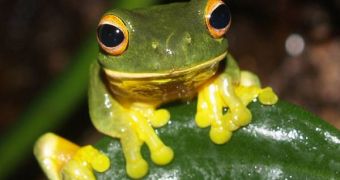Ironically, the constant rise of temperature in the atmosphere affects even those animals and plants that are already used to heat. They are forced to relocate northwards, following their ever-shrinking habitats, or move to higher elevations, in search of the temperatures they are adapted to. Some species may lose their natural habitats altogether, as severe deforestation in some regions of the globe prevent them from changing their current living areas.
Robert K. Colwell, an ecologist at the University of Connecticut, published a study in today's (October 10th) issue of Science magazine, detailing the exact patterns both plant and animal life use to escape the heating. Though temperature variations may seem negligible to humans (3/4 degrees Celsius - 1.4 degrees Fahrenheit), the research showed that they could have potentially devastating consequences for the wildlife. Even with these relatively low warming levels, the change in temperature zones pushed them upwards by about 600 meters (roughly 2000 feet).
This means that animals, insects and plants used to living at designated altitudes now have to travel upwards to encounter the same atmospheric conditions they are accustomed to. Colwell analyzed more than 2000 species of organisms during his study of a Costa Rican volcano about 3000 meters (10,000 feet) high. Some of the species he cataloged have very limited survival zones, and the slightest change in temperature could force them into a territory unknown to them, to which they are very unlikely to adapt.
The rain forests are most subjected to threats, given that animals and plants can easily relocate to other areas. Without animals in their natural life cycles, forests are at risk of dying over a few years. However, there are a few species of animals that live in warmer climates and there is a slim possibility that they would move in and replace those that moved north or upwards. Nonetheless, the characteristic biodiversity of the rain forest will be lost permanently.

 14 DAY TRIAL //
14 DAY TRIAL //